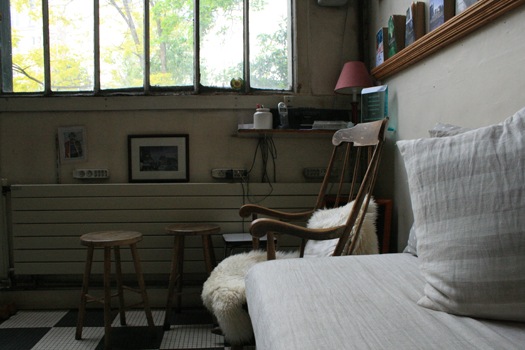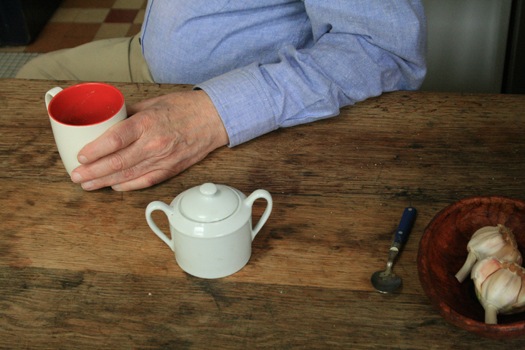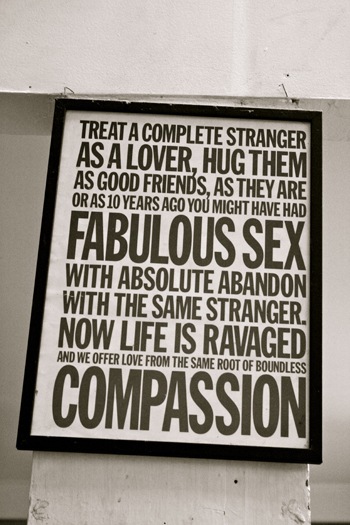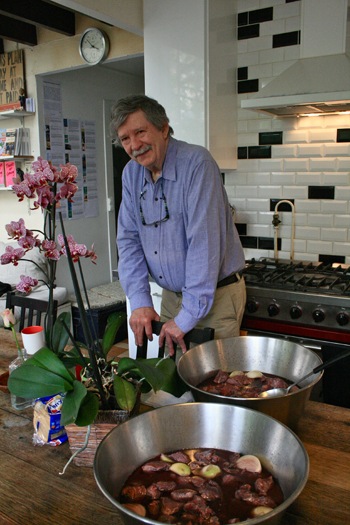Jim Haynes – Atelier A-2 and Sunday night salons
Posted on May 7, 2014 by VINGT Editorial
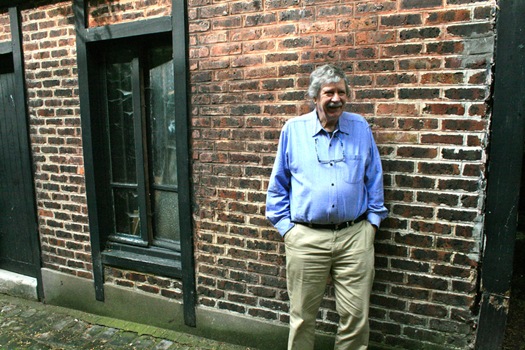 Words: Jill Pope
Words: Jill Pope
Images: Alex Leggett
I imagine that journalists the world over are united in their trepidation of interviewing people who have reached “legendary” status. It’s hard to know how to probe beyond an image already immortalised in so many words. Jim Haynes definitely inspires that trepidation – this is a man who has played host to over 150,000 people at his feted Sunday-evening Parisian dinner parties, who founded Edinburgh’s Traverse Theatre (which amongst his many achievements he says he is the most proud), who has been a part of, in some shape or form, so many of the latter 20th century’s cultural, artistic and political movements. Wary of resorting to effusive clichés to describe what by anyone’s account is an astounding track record, I would prefer to stick to two very simple truths that struck me when we met: Jim Haynes is a man of action and Jim Haynes loves people.
Jim moved to Paris in 1969 to teach media classes at University Paris 8, and something about the city encouraged the man who had previously said he could live in any city (Louisiana-born Jim grew up in the US, Venezuela, and lived in Edinburgh, London and Amsterdam before the move to Paris) to stick around longer than anywhere else before. He has lived in the same magnificent 3 storey atelier/apartment (where his dinner parties are held) in the 14th arrondissement since a year after he arrived in the city. Anyone who has endured the soul-destroying housing search in Paris could easily understand why; the almost floor to ceiling glass windows shed light even on a dim day, overlooking the leaves and flowers in the long garden outside. Jim said the neighbourhood has barely changed during his tenure – this place has been his base for over 35 years, and thanks to the dinner parties, is no doubt indelibly associated with him in the minds of his many guests.
Reading over the highlights of Jim’s life to date (both pre and post Paris) is vicariously exhausting. Throughout his eight decades Jim has not just been involved with things, as others sometimes seem to be almost by accident, rather he has established, founded, pioneered, championed, produced and driven countless artistic and cultural associations, endeavours, publications, festivals and activities. He loves the visionary stage of projects, being the fuel to the fire, his irrepressible energy and pie in the sky thinking has proven invaluable to getting projects off the ground. He sees his work in the arts as political not just because “everything is political” but because “the arts are a way of saying something, and I like saying things”. As you would expect with a career spanning that many eras, the constant evolution of society has put some of Jim’s work in a different context. He is thankful that some of his more provocative projects, such as Amsterdam-based erotic magazine SUCK and the Wet Dream Film Festival – which he started in the early 1970s to demonstrate to the social conservatives prevalent in the day “that you could go and see an erotic movie and come out without warts on your hand” as he put it – would no longer raise more eyebrows, as he perceives that the overall level of sexual acceptance and tolerance has improved since that time, at least in a lot of the big cities of the world.
To explain his “do it yourself” mentality he cited a Gandhi-esque philosophy: “the most important political statement is the way you live your life and how you relate to other people”. In an anecdote that almost doubly proves his point, he explained to me how his autobiography was conceived of and written in mere months purely in order to win a bet against a former lover, the prize of which he was no longer even interested in. But what allows the already extraordinary sheer breadth and volume of Jim’s experiences to become almost absurd is the supporting role fortune plays to his tenacity. Realizing I am from Melbourne, Jim tells me about his visit to Australia, part of a round-the-world trip offered to him as a gift by a woman he had met by chance and given directions during a fashion shoot – she turned out to be the Mayor of Melbourne’s wife. This element of luck is a running theme in his life, one of his own private jokes in a way, and as we discussed this he recalled countless other instances: how he met a travel-mate by over-hearing a conversation in a bar next to his home, how he bumped into Polish writer Ryszard Kapuściński, who he had been meaning to call during a trip to Warsaw, at his next stop in Berlin. Although a lot of this could be put down to fluke or coincidence, it’s also Jim’s ability to seize these moments, and remain nimble enough to do so, that has enabled him to take them to these fantastic heights.
Despite everything he has seen and everywhere he has been, Jim is anything but world-weary – that thirst for adventure appears to be unquenchable, as is his appetite for new people and friends. He is excitable, candid and genuine, but I couldn’t help but wonder what happens when a self-confessed ‘people collector’ meets someone they don’t like? He jokingly retorted “I’ve never met someone I didn’t like” and then turned serious, admitting that it really is the truth, and that even character traits he may find annoying on first impression become endearing qualities over time. How does he keep track of so many people – do older friendships or his family suffer at the expense of new acquaintances? He assured me that this isn’t the case, that there is always time as he “lives in the present tense” although he also has “fond memories of the past, and a modest anticipation of the future”. A true extravert, he’s never lived alone, there has always been a flatmate, a lover, or friends crashing at his place, and he prefers it that way. He is quick to play down his reputation as somewhat of a lothario, although his manner of speaking still betrays a lust for both life and people (part of his self-described existential optimist philosophy is to “leave every place and every body better off for me having been there”) and clarified that what is more important to him is tenderness “that people should be able to hug more, to touch one another”, an approach he believes would rid the world of a lot of its current angst. It is that opportunity for human moments that keeps the dinner parties rolling on, each Sunday anywhere between 40 and 70 (and sometimes over 100) people converge on Jim’s place to connect with new friends or old, and find out for themselves what lies beyond all the words that have been written about their legendary host.
83 rue de la Tombe Issoire, Atelier A-2 , 14th
Metro: Alesia (4)
Hours: Every Sunday at 8pm
To register, contact Jim through his website, jim-haynes.com,
call Jim on 01 43 27 17 67 or email to confirm.
